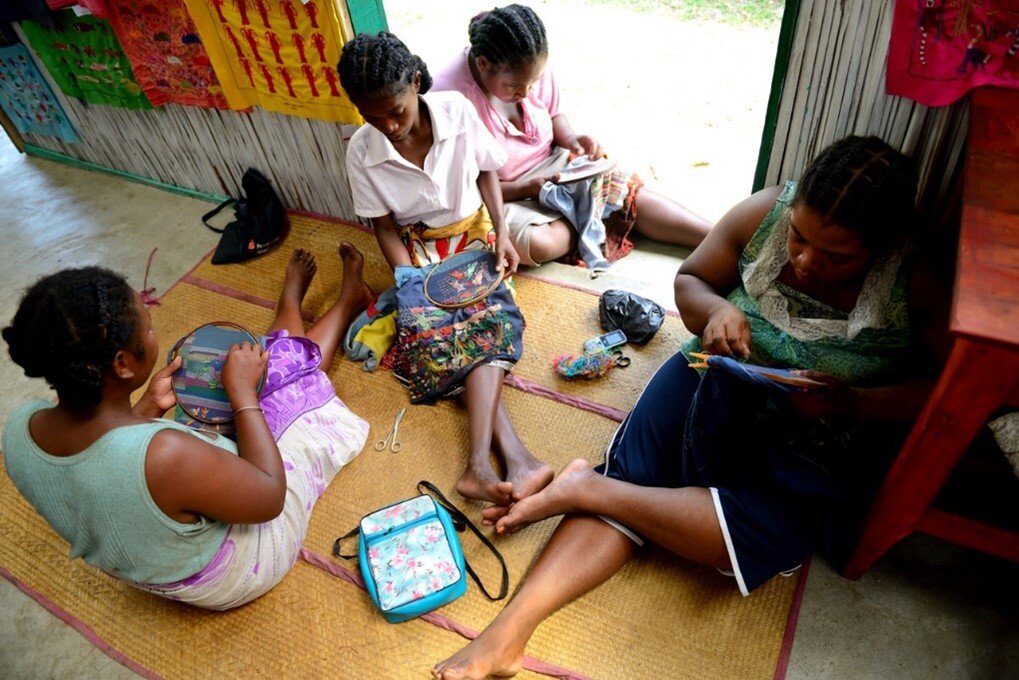![]()
Whether it is through Project Mahampy, Sakondry, or Recovery & Resilience, SEED aims to meet both the immediate and longer-term needs to contribute to the alleviation of poverty in southeast Madagascar. Our projects work to provide relief and emergency response when necessary, but continue to emphasise the importance of tackling issues at the root cause and building community resilience.
Our recent blog highlights capacity building for health centres and health workers as an example of SEED’s long-term thinking, whilst also stressing the need to address root causes of poverty through sustainable livelihoods. The region of Anosy was faced with a difficult first few months of 2022 resulting in mass-income loss and a devastating food crisis, exacerbating high poverty rates. Whilst the Emergency Food Distribution Programme supported immediate recovery in malnutrition, the Recovery & Resilience program worked to train caregivers, host information sessions, and on the whole, promote the long-term health and nutrition of families. Improved community member’s knowledge of health helped to combat malnutrition at the source while a heightened awareness of the limitation on women’s employment opportunities accentuated the importance of livelihood projects. This is of great consequence due to the above-average number of single-mother households in the region, coupled by the restrictive cultural expectations of them. In addressing these long-term, root causes, sustainable community recovery and resilience can be built.
Sakondry: Finished
Named after the bugs themselves, Project Sakondry aims to increase food availability and contribute to malnutrition alleviation across five rural communities in the Anosy region through the establishment of household insect farming. In 2021,a three-month pilot, aiming to address COVID-19 related food insecurity saw 100% of households successfully germinating seedlings (2,769 plants total). There was 100% training session attendance, and the end of the project was met with a high motivation for project expansion; 100% of beneficiaries were eager to increase edible insect numbers.
Building upon the successful pilot, SEED delivered a 6-month project, kindly funded by the Canadian Fund for Local Initiatives, that aimed to increase diet diversity, increase food security, and contribute to malnutrition alleviation across five rural communities in southeast Madagascar, through the establishment of Sakondry farming. The project responded to the heightened vulnerability of rural women and children to poor dietary diversity and higher food insecurity as compared to men in their communities. By targeting women as the primary recipients of training, skills and knowledge were directly imparted to over 430 women in five rural communities. With female beneficiaries identifying as the primary caretakers of children and the household, facilitating a livelihood opportunity close to home that requires low input rendered edible insect farming more accessible and feasible than more time- and resource-intensive supplementary livelihoods.
You can read more about Project Sakondry and its impacts here.
Mahampy Phase 1: Finished
The completion of the first phase of Project Mahampy substantially strengthened mahampy weaving as a livelihood opportunity for women in Sainte Luce. The Mahampy Weavers’ Cooperative was established to increase the weavers’ supplier power, and the Mahampy Weavers’ Workshop to create a space for sales to local buyers and tourists. Throughout the project, training sessions were conducted to build the capacity of weavers and the Cooperative to increase their income. Regular wetland monitoring, conducted by both SEED’s Conservation Research Programme (SCRP) and the weavers themselves, have contributed to gaining a better understanding of the mahampy reedbeds.
The Mahampy Weavers’ Workshop opened in April 2021 and was used by the Cooperative to store mahampy reeds and host training sessions. The Workshop has been an effective means of increasing the weavers’ sales capacity, addressing a need identified by the weavers’ themselves. The weavers have begun using the Workshop to store and sell mahampy products.
To continue building on the progress made in Phase I, Project Mahampy: Phase II will play a crucial role in supporting the Mahampy Weavers’ Cooperative to increase the income generated from mahampy weaving, whilst sustainable management of the reedbeds will ensure the future of mahampy weaving as a women’s livelihood activity. To increase the number of sales through the Mahampy Weavers’ Workshop, SEED will build an extension to the current building in order to enable weavers to utilise the space for weaving purposes. In addition, SEED will improve the Cooperative’s routes to markets through increased engagement with local and regional buyers. Phase II will play a crucial role in supporting the Cooperative to increase the income generated from mahampy weaving, whilst sustainable management of the reedbeds will ensure the future of mahampy weaving as a women’s livelihood activity.
![]()
![Share on Twitter]()
![Share on Facebook]()
